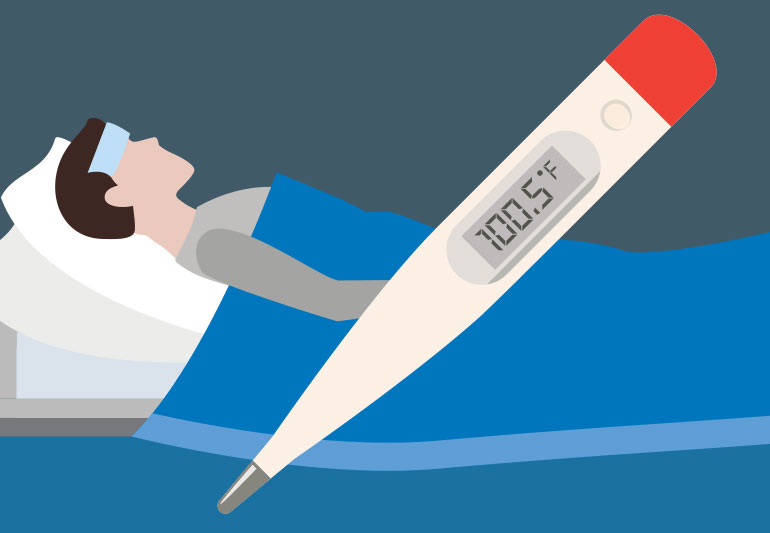Fever Causes

Fever refers to elevated body temperature above its normal range, on average 98,6 F (37 C). The normal body temperature varies from person to person and maybe up to one degree higher or lower than 98,6 F (37 C). Besides from one person to another, body temperature also varies throughout the day and is always lower in the morning than in the late evening hours.
Menstrual cycle, intense exercise, exposure to high temperatures, hot baths, and some other factors may also influence the body temperature.
Fever is almost always a symptom of an underlying condition, but the degree of fever does not necessarily indicate that condition’s seriousness. Sometimes a minor illness results in high fever and severe underlying diseases, only slightly elevated body temperature.
However, body temperature higher than 103 F (39,4 C) in adults and 101 F (38,3 C) in infants requires medical attention. It is also necessary to contact your doctor if you have a fever longer than three days or have a fever and are abroad recently.
Aside from higher body temperature than a normal fever is typically accompanied by other symptoms which depenonom the underlying condition causing fever.
Common Causes of Fever
Most common causes of viral fever infections such as cold and flu commonly also result in:
- Shivering
- Headache
- Sleepiness
- Loss of appetite
- Sweating
- Muscle ache and general weakness
While high fever – higher than 103 F (39,4 C) may also include confusion, hallucinations, and convulsion but these disturbing symptoms typically do not cause any severe complications.
In addition to viral infections, fever can also be caused by bacterial infections, which commonly require antibiotic treatment, sunburns, and certain medications. Fever may also be a symptom of a severe underlying condition, including cancer. Still, fever is only a sign that the body is fighting off a harmless infection in most cases.
It commonly goes away within few days on its own, while most adults and children tolerate fever for a short period without any significant problems. Several over-the-counter medications can be used for lowering high body temperature, but fever up to 102 F (38,8 C) helps the body fight off the infection.
Since the degree of fever does not reveal the seriousness of the underlying condition, it is necessary to pay attention to other symptoms. In rare cases, the cause of fever cannot be identified and is diagnosed as a fever of unknown origin.
Trending Health Topics
- ADHD
- Allergies
- Arthritis
- Bipolar Disorder
- Bunions
- Car Accidents
- Chron's Disease
- Common Cold
- COPD
- Depression
- Dry Skin
- Dry throat
- Eczema
- Fungal Infection
- GERD
- HIV/AIDS
- Hypertension
- Irritable Bowel Syndrome (IBS)
- Multiple Sclerosis
- Osteoarthritis
- Psoriasis
- Rheumatoid Arthritis
- Skin Disorders
- strep throat
- Type 2 Diabetes
- Uncategorized